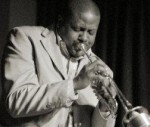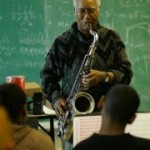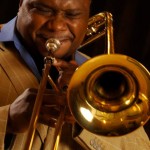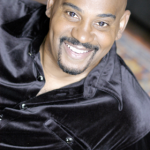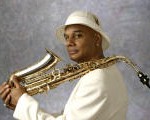NEA Jazz Master Benny Golson is one of the most erudite musicians, a true master of elocution and language. A man of abundant wisdom and wit, Golson is one of the most agreeable people in the music. When posed with our dialogue question, it seems this is a subject Benny has been contemplating for some time; his response was the following, the first of two related, common sense essays. Hard for me to find much if anything to disagree with in Benny’s take. How about you?
Again, our question to musicians:
WHEN YOU READ JAZZ JOURNALISM AND CRITICISM WHAT QUALITIES ARE YOU LOOKING FOR IN THE WRITER AND THE WRITING?
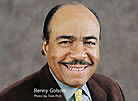
The Jazz Critic
by Benny Golson
There are times when we love the critics, while at other times we hate them. But realistically, we need them. Can you imagine every performing artist constantly telling everyone how good he is, or how bad he is, for that matter? We’d soon become suspect of those constantly telling everyone how good he is. And few would tell how bad they are because of not wanting to be viewed as bad. And what about not having enough talent or ability to actually know this. Result? Less than the truth might creep into the picture along the way because of one’s desire to actually be good, accepted, approved. There are some things in life that are ineluctable and this might be one of them. We realistically sometimes need someone to assess what we do, an opinion other than our own, an onlooker, a listener, a professional outsider. However, because of who the reviewer is and what he knows and understands, or perhaps what he does not know or understand, or perhaps is opinionated, we are sometimes “be damned if I do, be damned if I don’t.”
Unfortunately, many things can get in the way of an objective review though. First of all, a review is the professional opinion of the person reviewing, right or wrong, good or bad. Sometimes he’s sharp, sometimes he’s not. There sometimes exists the possibility that he might, for some personal reason, be vindictive, sad to say. Or perhaps he doesn’t really understand the length and breadth of the music, though he sophistically thinks he does, in which case he and his sophistry are off and running. This kind of thinking has even resulted in a few telling the reader what the person being reviewed was thinking when playing, or possibly what he was trying to achieve. That’s about as dense as one can get, unless the performer actually gives him privy to such information. Those who do this without any kind of verbal intercourse with the artist, lay themselves bare to much humiliation and criticism, of course. They sometimes get caught up in the suicidal arrogance of ignorance. I remember it happening to J.J. Johnson once back in the late sixties. J.J. came to his own defense and the reviewer was made to look like an utter fool. It also happened to me. The reviewer had put me down quite hard for everything I’d done on an album, and it was not true. The review was a complete vituperation, a non-poetic put down from beginning to end.
The reviewer was also a writer (arranger). I don’t think he was trying to elevate himself; he just didn’t like me or anything I stood for, therefore, becoming supererogatory, going far beyond anything that was necessary and relevant. Though I usually ignore this sort of thing, he’d gone so far as to besmear my reputation and character and bring my honesty and integrity into question. It was absolutely unbelievable. I had no choice but to retaliate. I asked Downbeat, the magazine in which his review appeared, if I could write a rebuttal. They said, “Yes!” Whereupon I meticulously dissected everything he wrote and honestly laid it bare before the readers. Downbeat printed every word, and there were many. After it appeared, I received myriad telephone calls of congratulations, not only from musicians, but from all sectors of the jazz community, many of whom I didn’t know.
Today? They sometimes, but thank goodness not too often, come up with a catechism-like review that contains only answers but no questions which gives the impression they already know everything. This exceeds presumptuousness and approaches insanity, because they not only evaluate the music but also try to assess and evaluate the mind as well. Most have wisely learned to avoid this practice, however.
But a word of caution to the artist. When a review is favorable, many of us tend not to worry too much, even if the performance was not good. In the end, however, each musician should know the quality of what he’s done no matter what shade the review takes. Even when receiving favorable reviews, if we know we have not excelled, we who are honest, often feel we’d like to apologize to everyone. On the other had, if we have excelled and get an unfavorable review, this tends to conjure up anger, or disappointment, or humiliation, and all kinds of frustrating feelings, perhaps throwing us into the realm of “The Law Of Unintended Consequences,” getting even tit for tat, and perhaps even a bit more if possible, in spite of all else. Therefore, we, the musicians, must have a balanced view about what we do and how it’s received. Even must realize that even with superhuman effort we can never please everybody; it’s impossible. But that’s not what we set out to do; we must, without arrogance, please ourselves first. However, we’re not obdurate concerning audiences-we do what we must and hope they like it. In either case, good or bad, if the information by way of a review is not accurate, the public is sold a bill of goods because of the way a reviewer heard it, unfortunately. But in his defense I must say he just might be right.
One will always feel good about a favorable review. But if he’s honest, he should sometimes feel good about an unfavorable one. Why? Because, as I said, the critic might be right and the one being accessed could benefit from his review as he tries to improve and/or re-think things, providing he is indeed completely honest.
At times, but not always, it’s the reviewer’s personal taste that guides him rather than objectivity. As a result, strange, convoluted and aberrational things begin showing up in his evaluations, even though he might actually mean well. No critic is ever anasylphallic-like nor a Tabula Rasa. Though we’d sometimes like to accuse them of these physical and mental afflictions; most have good minds and are able to make good use of the thinking process. What is sometimes brought into question, though, is what they think of when putting pen to paper. Compounding the matter are those fans, and would- be-fans, who word for word, accept everything these critics write as seeming oracles of truth, which in reality is sometimes as believable as the myths, “One size fits all,” or “On time airline departures.”
Some so-called critics approach their writing pads with preconceived ideas about the way music should sound. That is, subjectively according to the way they would like to hear it. This is not a critic, but, rather, merely a person with an opinion. We can find these kinds of people on the street on any day. With these kinds of ‘critics’ there seems to be no objectivity, that is, the ability to accurately evaluate something though they might not like it. During the Summer of 1998, I read a review of a new Sonny Rollins release that was an example of this. The reviewer accused him of ‘playing it safe.’ He was obviously leaning toward avant garde and Sonny did not fit into his thinking nor preferences. How sad for the reviewer, of course. In fact, he compared him to a couple of avant garde players. It’s almost a sin to pejoratively speak of Sonny that way. I’ll go a step further and say something I don’t usually say: The person who wrote that review is an outright idiot.
Never in a million years would I have at any time want to play like Paul Desmond. However, whenever his name comes up, I am compelled to say that he was a master of the saxophone; he knew his horn inside out. The man was a genius at what he did. I was fortunate enough to tell him this before he died. These opinionated ‘critics’ would never be able to do this because they walk around with pen in hand, overloaded to the point of ’tilt’ with personal tastes and preferences. Results? The people who don’t really know, but would like to know what’s happening with artists — the value of what they do — are sadly misled. That is, by a subjective point of view. Such reviews are colored with personal opinions that are highly prejudicial. The saddest thing is that they might not ever be aware of it; they’ve then completely involuted into themselves.
When a critic begins an in-depth evaluation concerning a concept, it is no longer a review but an article about the topic. As a critic, he should review on the basis of what that particular artist is doing, going into depth about him pertaining to the concept. Such reviews, then, are as recruitment invitations for others to join them in their misappropriation of objective truth.
Once on opening night of Dizzy Gillespie’s band at Birdland in 1957, the New York Times sent a critic to review the band. We played our hearts out as we did every time we hit the bandstand. The first number or two, however, was a bit off, probably because we went into the engagement after having been off for a couple of weeks. After those numbers, however, the band caught fire, nothing could stop us. The next morning we looked for the review. It was not a good one. It was so much in error that Diz did something he never did before, he called the New York Times. It was then that he found out that the critic was working under rigid time constraints, and having to get his review in by a certain time that night. As a result, he didn’t stayed for the entire set. The newspaper sent him out once again this time giving us the proper amount of time for an accurate review. The review was coruscate. This sort of situation, however, is usually aberrational.
If x does his homework as well as he thinks we should do ours as performers, he would become aware of the many things that would help to bring his assessment into sharper focus. For example, when he speaks about a person’s sound on a particular recording, is he really familiar with the sound the person usually gets on other recordings and in “live” performances? Of course, all of his concern would be directed at that particular performance, but if he’s not aware of anything beyond that recording, he’d be depriving readers of things they would find extremely interesting. People love to have privy to things not usually known. They absolutely love it! Would he be able to tell if the resulting sound was because of inferior microphones, or bad placement of them, or bad recording techniques? Would he be able to hear a reed problem? Would he be able to hear a major third being played instead of a minor third? Would he know what chord had no place in the scheme of things? Few are that specific, most are general. This is definitely not a put down, but what’s absolutely true of some. Would he be able to hear a mechanical problem with the horn? Would he know the limitations, if any, of the instrument(s) being discussed under certain conditions? Is the drum head worn? Are the snares on the snare drum working properly? Is the drummer playing with a thick or thin stick? The cymbal sound is different in each case.
Once in the 80’s, The Jazztet recorded in Milano, Italy and Tootie Heath, our drummer at that time, had to use a telephone book instead of his snare drum which was broken, that is, a telephone book in place of a snare drum. To date no critic ever caught it, that is, those whoever reviewed the album. Why not be able to thoroughly explain why things are so. “Why” always makes for greater interest. Some critics don’t deal with it for fear of being wrong, or for feeling it’s not important. But shouldn’t one be as good as he can possibly be at what he does? Musicians are often reviewed from that prospective. But this takes more than merely having and giving an opinion; anyone can do that, right or wrong. More depth of facts and elements would make a review go far beyond ordinary reviews, enabling readers to metaphorically be in the studio or on location with these musicians, feeling what they feel over and over again each time they listen to their recordings. Whoever has the ability to review on this level, would, of course, be a few feet taller than the rest, and we do have some that “tall.” But then there are those who merely think they are. I know of only a few who are able to review on such a deep level. Many, in trying to do so, postulate and give out false information. But this is bound to happen from time to time since, as I’ve already said, we’re all imperfect creatures. In and of itself, this is not worthy of a put down. It only becomes so when one does it time and time again as he reaches out from his cocoon of ignorance, and sometimes with arrogance, boldly touching creative things under the guise of a bonified assessor.
Those who are able to really understand and deeply assess what they hear are not necessarily “big” names, though some are. Some names are obscure and some of the places from which they come are obscure. But quite often they’re “on the money.” In our system of things there are no critics of critics, no reviewers of reviewers, assessors of assessors, but if there were, we’d read many of the same kinds things about them as we presently read about the musicians they access. Few people are exactly the same. In whatever pursuit exists, you will always superlatively find poor, fair, good, and superior. This, of course, is life. Those who are the best heroically and intuitively help balance out the disparity among the others: things relating to magnitude (importance, consequentiality) , quantity, quality — the inequality between them and the other levels falling well below. With this, life sometimes becomes worthwhile … sometimes.
Anyone who loves and follows jazz can tell you if he likes a particular recording or not, but shouldn’t a critic be able to go far beyond this? … and accurately so? He makes a mistake now and then, of course, as we all do, however, accuracy should outweigh the mistakes. It’s often, but not always, perhaps a better situation if the reviewer is, or was, a performing musician of any consequence; he’d be able to come closer to this deeper level of which I speak…maybe. Though it might sound as if I’m oxymoronically contradicting myself, it’s absolutely true that there are critics who have no playing ability of any instrument, yet can write on this deeper level. So, there is no rule of thumb. I say this because there seems to be as many differing levels of assessing as there are critics. A writer (arranger) must have this kind of knowledge I speak of in order to bring validity to his writing. Should the critic be exempt from this magnitude, this intensity of reviewing? or should they be just as thorough and knowledgeable as they expect us to be in our performances? Especially since they sometimes have the ability to affect minds and careers this way and that. There’s more to being a meaningful critic than meets the eye. Not everyone is up to it, in spite of their love for the music, just as some musicians are not able to come up to certain standards. In either case, the reach of both sometimes exceeds their grasp.
The musician should always know his strengths and weaknesses, where he’s going and what he’s doing. Therefore, a musician should know when a review is accurate. Sometimes, for whatever reason, he, unfortunately, does not. If a bad review is accurate, he should force himself not to think more of himself than he should. Pride should be thrown out the window lest he continues on a questionable course. He should also try hard to put aside anger and related feelings, and use that energy to successfully resolve whatever is in question, if it is, in fact, in question. His concern should be about moving ahead rather than a thirst for glowing words describing him and his talent. Believe it or not, even when the review is not favorable, there are critics who can sometimes cause us to try harder, depending, of course, on how their review reads, hopefully, without any traces of negative, unnecessary hegemony or pejorative rhetoric. Poetic, pedantic, masturbational, and blatant “put downs” never accomplish anything positive. As musicians we can’t afford to devote large portions of our time nurturing anger, humiliation, and vindictiveness. It would slow down our “forward motion,” that invaluable learning process which is so vital to us all. Would it be worth giving up our dignity for? But what do I mean by masturbational? I refer to the use of opinions coated with poetic and arcane language, and sometimes sesquipedalianism — long words that do nothing for the review per se — that tend to draw attention to the words and to the critic rather than to the music. The words then become more important than the things they purport to describe. The pot becomes more important than the things they contain. Any critique should not only grow out of the knowledge afforded it emanating from the music and the artist it’s critiquing, but, the critic, should be purely objective and have the greatest positive and lasting effect, hopefully. The critic? When all is spoken, when all is written, when all is read, he is an indelible part of our lives. He’s the hero and the villain. But, then, so are we the musicians, unfortunately. In the end, concerning the Jazz critic, we’re left with two burning questions: What will he write and how will he write it? Yes, and let’s not forget, how will we receive it?
NEXT TIME: Benny Golson weighs in on The Value Of An Interview
